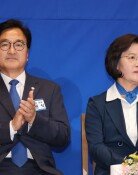Tax Officials Cracking Down on Racketeers, Tax Evaders
Tax Officials Cracking Down on Racketeers, Tax Evaders
Posted March. 17, 2009 09:23,
The head of a school lunch provider reportedly used cheap ingredients such as low-quality powdered red pepper from China when supplying school lunches to 20 middle and high schools in the Seoul metropolitan area over the past three years.
Identified only as Kim, he conspired with a food supplier who had no involvement in the business and created a slush fund of 2.2 billion won (1.52 million U.S. dollars) by fabricating receipts to make it look as if Kims company bought high-quality domestic ingredients.
With the illicit money, Kim offered school officials golf tours in Southeast Asia, including the principal, and bought real estate for himself. Tax officials also charged Kim with evading corporate taxes of 1.6 billion won (1.1 million dollars).
The National Tax Service audited business owners who disrupted the peoples livelihood or took advantage of them between November last year and early this month. The office yesterday said its investigation found 165 racketeers and tax evaders who owe a combined 119.3 billion won (83.3 million dollars) in back taxes.
A tax official said the tax evaders took advantage of people. For example, 64 owners of private academic institutes raised their tuition under the pretext of adding essay classes in their curriculum. The official said the owners exploited the devotion of Korean parents to their childrens education despite the economic downturn.
The 64 owners were taxed an additional 45 billion won (31.4 million dollars).
Tax-evading undertakers also took advantage of the Korean practice of providing a proper funeral. One undertaker is known to have sold Chinese-made shrouds at nine times their original price. He accepted payment only in cash, which allowed him to evade import taxes worth 5.6 billion won (3.9 million dollars) over the past three years.
He was charged an additional 2.6 billion won (1.8 million dollars) in taxes.
Tax authorities also caught 57 private moneylenders who charged excessively high interest to people whom banks would not lend to. The moneylenders illegally sold their collateral for late interest rate payments.
Thirty-seven illegal foreign exchange traders were also found to have embezzled money to invest in lavish real estate overseas or to gamble, while neglecting to pay employees.
Chae Gyeong-soo, head of audits at the tax office, said, Weve postponed our regular tax audits to allow business to focus on overcoming the economic crisis. Nonetheless, we will strictly continue our investigations into racketeers and tax evaders who take advantage of peoples economic woes.
jefflee@donga.com







